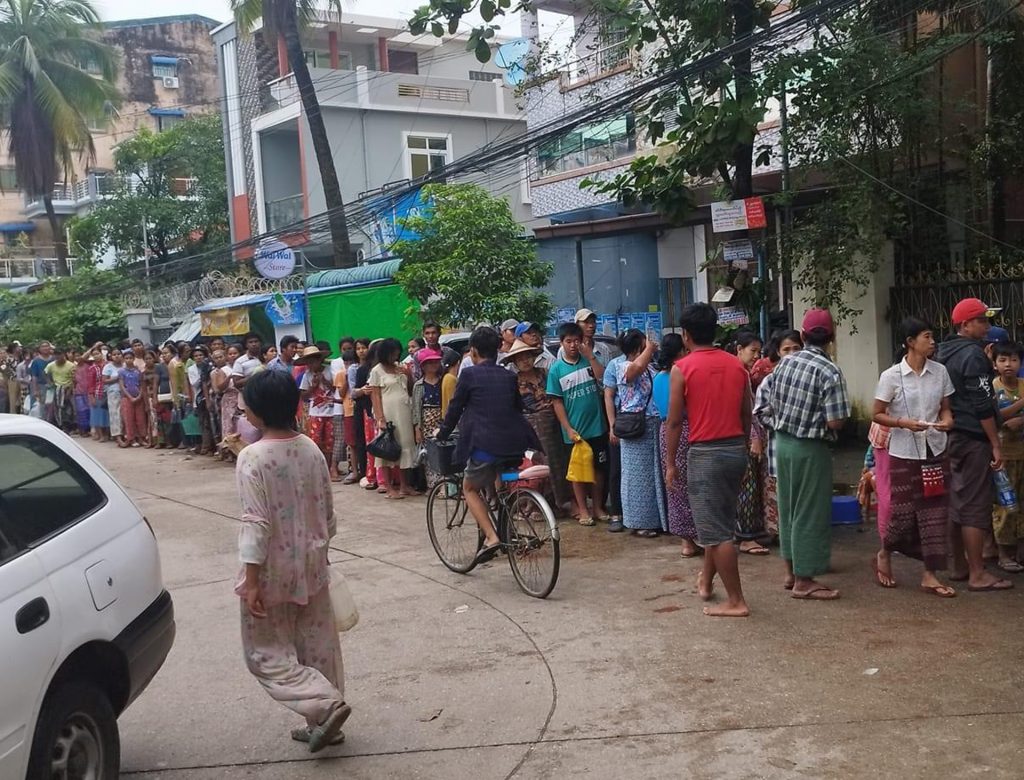Insight Email No. 24
This Insight Email is published on October 2, 2023, as a translation of the original Burmese language version that ISP-Myanmar sent out to the ISP Gabyin members on September 29, 2023.
There used to be talk of Kremlinology, Pyongyangology, and Pekingology, the study and speculation on politics and policy changes in closed societies, and now we have something we can call ‘Naypyitawlogy’. For this week’s Insight Email No. 24, ISP-Myanmar focuses on the moves at the center of the junta. Moreover, the bulletin discusses the daily struggles of ordinary people, especially in less affluent communities, as presented in the findings of socio-economic surveys conducted by the ISP-Myanmar. Myanmar, a place of abundance of food in the past, has now become a myth. Added to the burden, the extreme weather phenomenon El Niño is coming. The bulletin also explores job satisfaction of public servants in Myanmar, and finally, developments at the Myanmar-Thai border regarding the possible Nam Yuam River diversion project and plausible impacts.
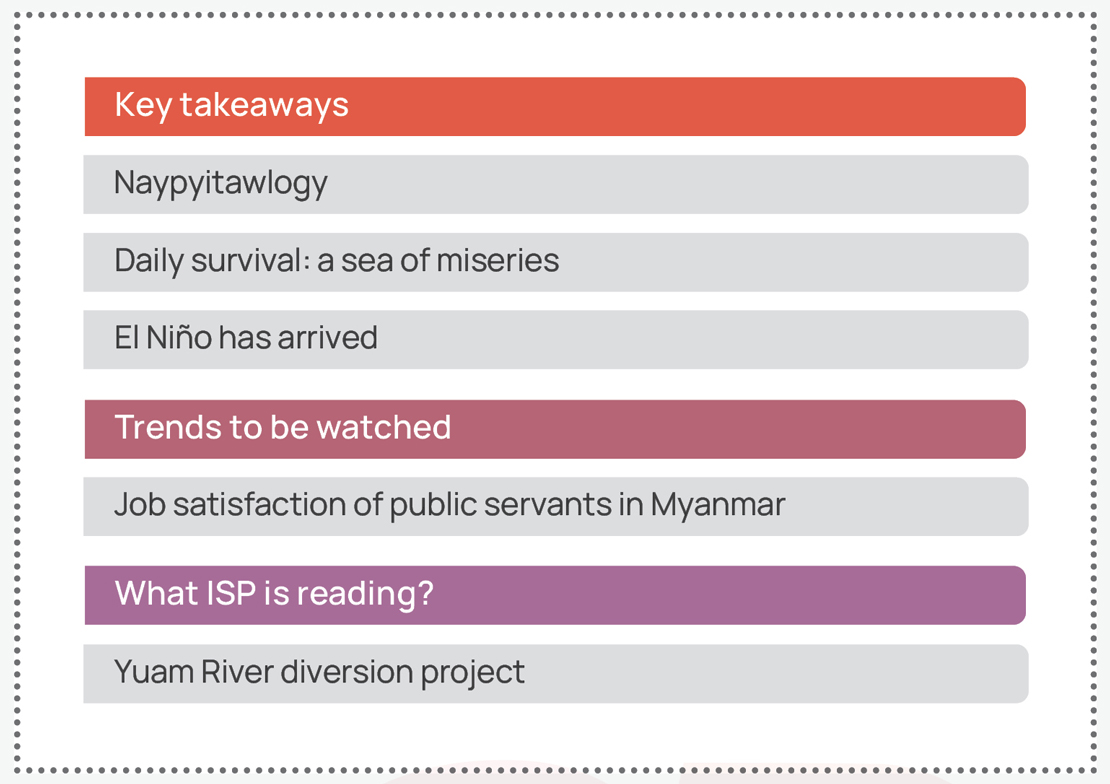
∎ Key takeaways
1.Naypyitawlogy
There used to be talk of Kremlinology, Pyongyangology, and Pekingology: the study and speculation on politics and policy changes in closed societies like the Soviet Union, China, and North Korea. Who is sitting with whom, or Chairman Mao swimming, were unusual factors to be observed. Now we have something we can call ‘Naypyitawlogy’: watching the political weather in Naypyitaw after the coup. On September 25, 2023, SAC members, Lt. Gen. Moe Myint Tun (DSA-30) and Lt. Gen. Soe Htut (OTS-64) were sacked from the leading committee with the reason of ‘abusing power and privileges’ and replaced with Gen. Maung Maung Aye (DSA-25) and Lt. Gen. Nyo Saw (DSA–23). Moe Myint Tun is reportedly detained and being investigated. Soe Htut, who is suffering from malignant disease is assigned to return to unit (RTU) in the military.
During the two-and-a-half years of SAC rule, the State Administration Council (SAC) was reorganized four times. The SAC was formed with 11 members on February 1, 2021 (adding another 5 civilians within one day and another one on March 17, making a total of 17 members); again, on February 1, 2023, the SAC was reorganized with 20 members. It was reorganized yet again on August 2 with 18 members, and with another replacement made 18 members on September 25, 2023. The SAC is generally formed with half being members of the military and half civilians. It is strange that there were three reorganizations in 2023. During the first two and a half years, 15 of its members were removed (three of them were from the military and 12 were civilians.) Among the three members removed from the military component, Gen. Maung Maung Kyaw, C-in-C of Myanmar Air Force (DSA-26) was first. The members removed from the SAC in the civilian component were, U Thein Nyunt, U Khin Maung Swe, Daw Aye Nu Sein, Jeng Phang Naw Taung, U Moung Har, U Sai Lone Sai, Saw Danial, Dr. Banyar Aung Moe, U Maung Ko, Dr. Aung Kyaw Min, Dr. Kyaw Tun, and Pugin Kamlian. Moreover, there have been many reshuffles on the executive side, in the cabinet positions. Ministers have been asked to retire, reassigned positions, and sent to Government Office Ministers’ positions, which play different roles.
In the recent reorganization of the SAC, the SAC is led by Snr. Gen. Min Aung Hlaing (DSA – 19) and Deputy Snr. Gen. Soe Win (DSA – 22) at the top, Lt. Gen. Aung Lin Dwe (DSA–25) as Secretary, and Lt. Gen. Ye Win Oo (OTS–77) as joint Secretary, Gen. Mya Tun Oo (DSA – 25) and Gen. Tin Aung San (DSA–23) remain the same as the original members of the coup council. Lt. Gen. Yar Pyae (DSA-22), a replacement for former Gen. Maung Maung Kyaw remains in place till now. From the civilian component of the SAC, Mahn Nyein Maung alone has remained permanently in the SAC through four rounds of reorganization.
In a keen examination of recent developments, it becomes evident that the newly appointed SAC member, Lt. Gen. Nyo Saw, is ascending to prominence. He was appointed as a ministerial-level advisor to the SAC Chairman in July 2023 and asked to take charge of state economic affairs immediately. He was appointed as Quartermaster General in 2014 and became chairman of the Myanmar Economic Corporation (MEC), owned by the military. He is a senior director of Myanmar Economic Holding Ltd. (MHEL) and is in charge of the military’s Innwa Bank. He retired from the Quartermaster General position in 2020 but still held the MEC Chairman position until now—almost ten years. In 2020, Lt. Gen. Kyaw Swa Lin (DSA-35) was appointed as Quartermaster General of the military, but he did not become Chairman of the MEC.
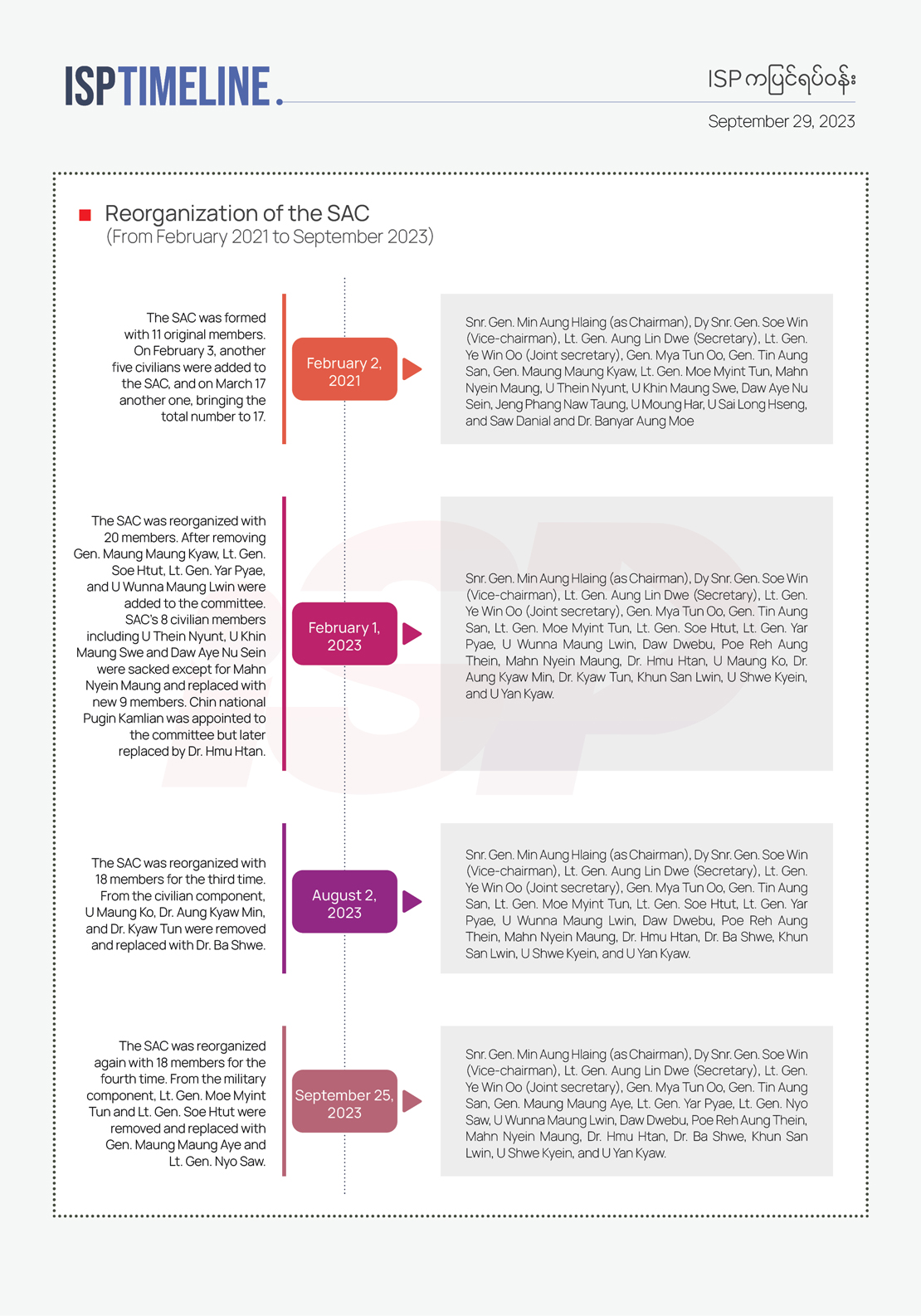
The coup council’s initial changes and reforms seemed to be collective decisions, and SAC and cabinet meetings were held quite regularly. But in 2022-23, the SAC’s actions were more inclined to be based on personalistic decisions of the individual at the top. The institutional, collective nature of the SAC is noticeably declining. This fact is clear when observing the frequency of SAC meetings. SAC meetings with all members were held eighteen times in 2021 but decreased to nine times in 2022 and four times in the first nine months of 2023. Similarly, cabinet meetings (meetings of the executive branch of government) are not frequent. Cabinet meetings were held four times in 2021, nine times in 2022, and four times in the first nine months of 2023. In comparison with SLORC/ SPDC rule during the previous military junta, Snr. Gen. Than Shwe held regular ruling council and cabinet meetings, except for times of travel.

Closed societies are principally opaque and it is hard to get access to information about political developments. In the age of social media, news cannot be as easily blocked as before. But we should be aware of the explosion of rumors and disinformation, which are more difficult to verify in closed societies. The situation could lead to a speculative environment rather than an informed analysis.
2.Daily survival: a sea of miseries
A basket of broken rice is priced at 3,200 Kyats now. People from less affluent communities must now queue at selling points to buy cooking palm oil at cheaper prices. Myanmar, a place of abundance of food in the past, has now become a myth. In some places of the dry zone, sources report that some people are now eating edible wild yams instead of rice. Myanmar people are currently struggling in a sea of miseries just to survive.
ISP-Myanmar is conducting a socio-economic survey to identify the daily challenges of people in Myanmar. In those 110 townships surveyed, skyrocketing prices are the main challenge for most people. According to July survey results, 106 townships out of 110 townships are facing the problem of rising commodity prices. Earlier this year, in May, 31 townships (28 percent) faced this particular problem, but in July it became widespread, expanding to 106 townships (96 percent of the surveyed townships). The second most hard-hitting challenge is electricity blackouts. 101 out of 110 townships are struggling with power shortages. This is already a widespread problem in the rainy season, and one can imagine how the situation could worsen in the winter and dry seasons, when there is less water to produce hydropower. The third challenge respondents cited was the lack of a sense of security due to the impacts of armed conflicts and rising crime. 92 out of 110 townships cited this challenge. These three challenges were minimal in May, but dramatically increased in June and July of this year. Additionally, the survey shows that many citizens have struggled with difficulty to grow crops stably, drinking water scarcity, shortages of staple foods, and forced displacement.
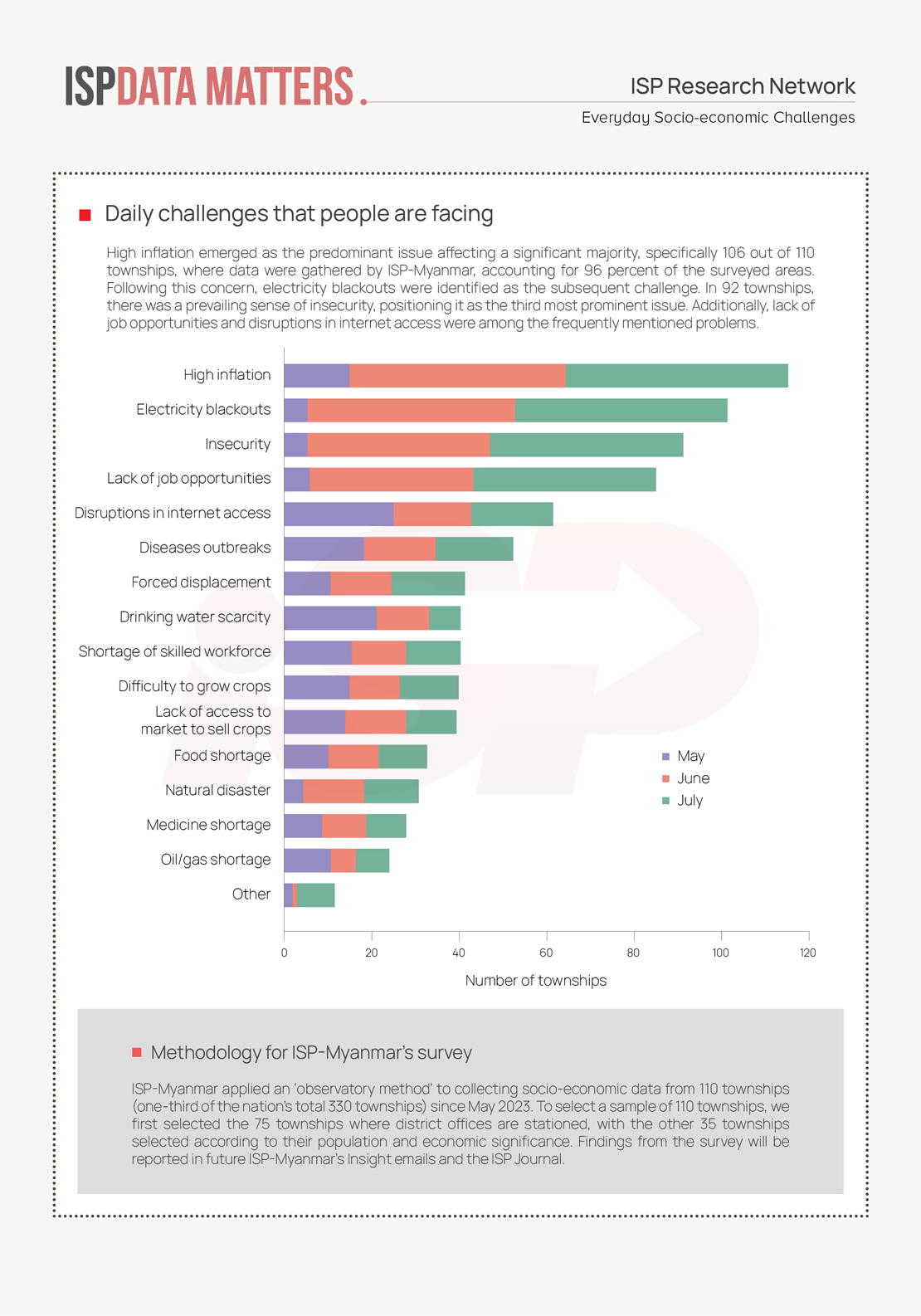
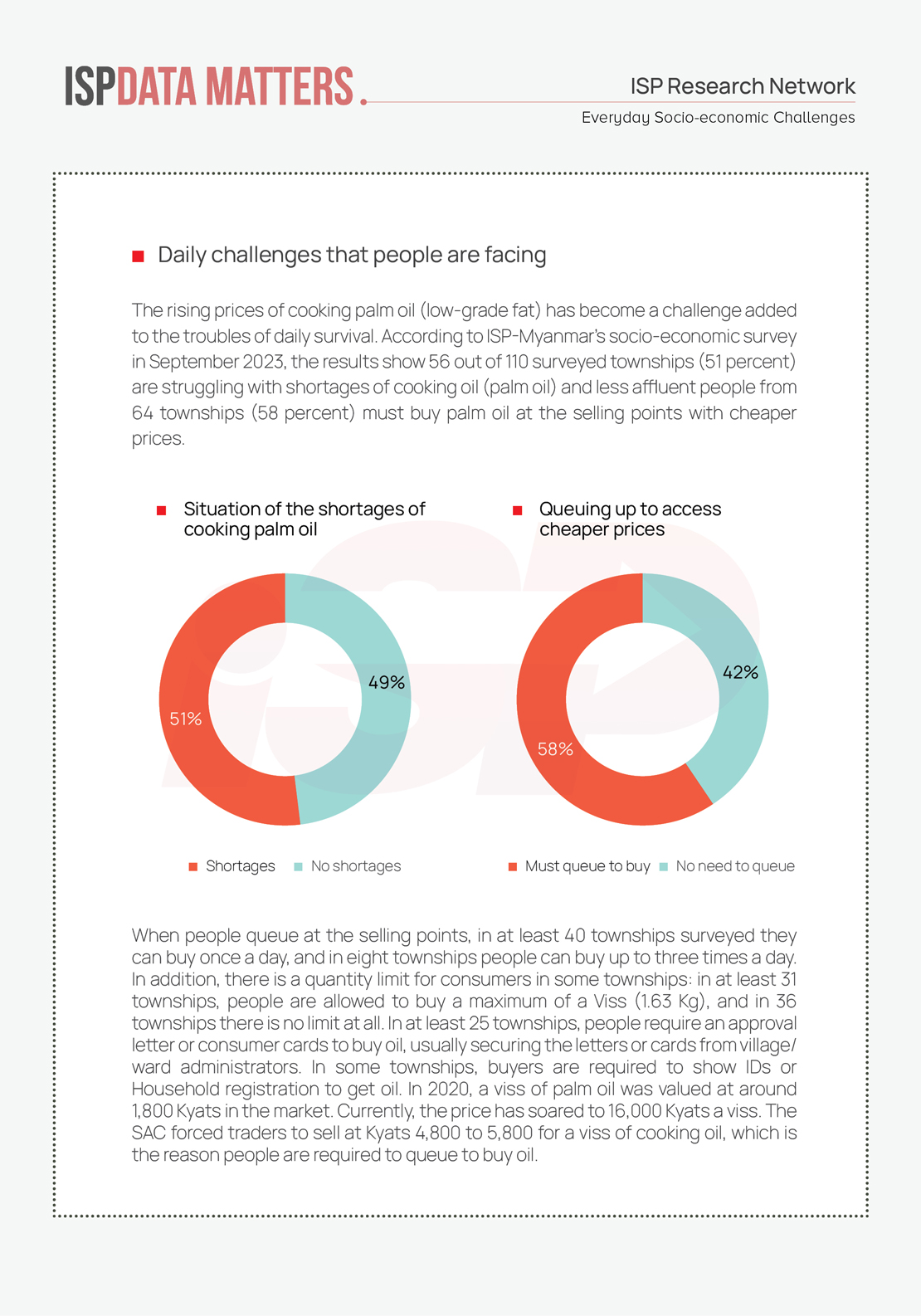
3.El Niño has arrived
Many governments and meteorologists warn that El Niño has arrived. The Economist mentioned in an August 24 article, ‘This El Niño is likely to be a strong one. The last such cycle was in 2014-16 and was ruinous in the countries it hit hardest.’ This time will be severe because it ‘will be felt on top of more global warming’. It will be drier, and droughts will lead to a crisis for world agricultural production, with some countries prohibiting rice exports proactively and food prices rising. Warmer seawater will have an impact on world fisheries. Several humanitarian agencies now anticipate crises of food security and outbreaks of disease including malaria, dengue, and cholera, calling for health and sanitation to be a priority. International agencies are struggling with emergency funding since natural disasters were estimated to have affected 185m people worldwide last year, but only about USD 4 million was provided through anticipatory measures.
Several neighboring countries are preparing for water management and other necessary measures if El Niño arrives soon. There have been several warnings about El Niño in the junta’s official newspapers. Independent weather forecaster, U Win Naing warned that the coming cold season will be less cold, and the hot season will be hotter for the whole country. In addition, the coming 2024 moonson season will arrive later than the 2023 monsoon season did. He added, “if a shorter rainy season, we will get less rainwater.” There is a lot to be prepared for, including, raising awareness, warning systems, public access to weather information, inclusive natural disaster responses, relief and rehabilitation, climate-sensitive budgeting, and last but not least, climate diplomacy to advocate with the international community.
ISP OnPoint No. 15 from May 2023 discussed how “Myanmar is already vulnerable to severe weather effects caused by El Niño. Now the country faces a potential ‘double jeopardy’ over future natural disasters as it continues to struggle with ongoing internal political strife. Society could face a downward spiral into an even more desperate humanitarian disaster. In recent years, Myanmar has suffered almost simultaneously from the COVID-19 pandemic and a military coup. The strain from additional protracted catastrophes could outstrip Myanmar’s ability to help itself and leave the country vulnerable to becoming a failed state.”

∎ Trends to be watched
Job satisfaction of public servants
Job satisfaction happens when employees feel like they have a stable job, room to grow in their career, and a good mix between work and personal life, which is important for productivity at work. Job satisfaction relates to someone’s workplace, and surrounding environment and these factors have an effect on job performance. It is important to observe the job satisfaction of public servants, particularly in the post-coup era.
The first factor affecting job satisfaction came during the 2021 Spring Revolution against the coup, when campaigners called on public servants to join the Civil Disobedience Movement (CDM) against the military government. The CDM movement was strong: according to National Unity Government (NUG) estimates, at least 417,060 public servants had joined the CDM from different sectors, including health, education, communication, railways, etc. Many public servants who did not join the CDM and remained in their positions would have experienced major psychological hardship over the decision. According to a report by the World Bank and Myanmar government’s Central Statistical Organization (CSO), at least 1,104,959 staff were working in the public sector in 2015.
A second factor affecting job satisfaction is the rapidly depreciating value of public servants’ earnings (salaries). Since the coup in 2021, the value of the Myanmar Kyat has depreciated 30 to 60 percent against the US dollar, which is calculated by official central bank rates. The value has depreciated more, by the terms of the market rate. A low rank gazzetted officer earns a salary of 275,000 Kyats a month (approximately USD 80). Compared to before the coup, when an officer could earn USD 180, now his or her spending power is significantly reduced.
Government servants pay increments have been granted on only five occasions in Myanmar between 1972 and 2010, coinciding with government changes in 1972, 1989, 1993, 2000, and 2006. Four such increments occurred during in semi-democratic periods (in the fiscal years of 2013-14, 2014-15, 2015-16, and 2018-19 fiscal years). Given the financial constraints faced by the cash-strapped State Administration Council (SAC), it appears unlikely that further salary increases for public servants can be contemplated. The Finance Minister of the SAC has, however, indicated that the council has offered supplementary benefits, including a uniform allowance (amounting to 30,000 Kyats since June 2022) and housing subsidies (eight percent of the base salary for married officers and four percent for singles) since August 2022. Furthermore, since October 2021, additional payments have been made by the SAC based on educational qualifications: 30,000 Kyats for Ph.D. holders, 25,000 Kyats for those with Master’s degrees, and 10,000 Kyats for postgraduate diploma holders. Nevertheless, the rapid escalation of inflation erodes the real value of these supplementary payments, leaving public servants with little perceivable improvement in their financial circumstances.
The third factor is the SAC’s inability to provide security for the civil servants. Civil servants stationed in Kayah (Karenni) State, Chin State, Magway Region and Sagaing Region dare not use the public transportations. Some places even called for commuting with army’s security or have to resort to air transport. In Kayah (Karenni) State, it is reported that the SAC is reducing staff members there and recalling them back to Naypyitaw.
Job satisfaction of civil servants relates to good leadership practices, good relations with management, recognition and advancement, personal growth, feedback and support, and working under clear direction and objectives. Factors leading to dissatisfaction include poor pay, poor compensation, poor working conditions, lack of promotion, poor benefit offerings, and lack of job security. SAC’s chairman, Min Aung Hlaing, blamed public servants for the failure of projects in a cabinet meeting speech on August 8. It is worthwhile to study the job satisfaction of Myanmar’s public employees during the post-coup era, including its impacts on their performance and how other negative outcomes, like rampant corruption, may emerge from this context.
∎ What ISP is reading?
Yuam River diversion project
During the COVID-19 pandemic, in September 2021, Thailand’s National Environment Board Chairman and Deputy Prime Minister Prawit Wongsuwan endorsed several Environmental impact assessments (EIA) of projects by the Electricity Generating Authority of Thailand (EGAT). One of the electricity-generating hydro-power projects includes the Yuam River diversion project from the Sob Moei district of Mae Hong Son Province. The project intends to build a dam on the Nam Yuam River and divert the water to the central plain of Thailand.
Although Thailand is planning to build this dam on its own river, it matters to Myanmar because the Nam Yuam River is a tributary of waterways flowing into the Salween River, one of the key main rivers in Myanmar. Nam Yuam River flows from Thailand and joins the Thaung Yin (Moei) River before it joins the Salween River at a confluence of rivers. The Yuam River flows through the Maela-U refugee camps and joins the Thaung Yin River near Phwe-Bawlu village, opposite of former Manerplaw Karen National Union (KNU) Headquarters. The planned 70-meter-high dam to block the Nam Yuam River is just 14 kilometers away from Myanmar’s border. The reservoir will be 332-hectares (3.32 Square-Km) and an estimated 582.68 hectares of forest area will need to be sacrificed from Thailand Mae Ngao National Park. The retained water will be pumped into a 61-km-long concrete water diversion tunnel to Hod District, and the water will refill the Bhumibol Reservoir in Tak province through the Ping River.
This hydro-power project was first conceived thirty years ago, in the early 1990s. The project is named the ‘Bhumibol Reservoir Inflow Augmentation Project’. In a previous estimate, the project was projected to cost at least 70 billion Bahts (USD 2.1 billion) and take at least seven years to build. But Weerakorn Khamprakorb, a Member of Parliament (MP) and deputy chair of a commission to study holistic water management, said last year that a Chinese state enterprise called Norinco International – a subsidiary of Norinco Group, one of China’s leading weapons manufacturers – offered to deliver the project for just 40 billion Bahts (USD 1.9 billion) in four years. However, there is no official document to confirm these details.
Recently, at the first cabinet meeting of the newly elected Thai government on September 13, it endorsed and signed an MoU to construct the Pak Beng hydro-dam on the Mekong, a project of EGAT. There are four projects in the pipeline waiting to be approved by Thai authorities, which include the Nam Yuam Dam and the Ban Khum (Salween River) Dam projects.
Local villagers, especially many Karen living in the impact area express concerns about damage to their environment, deforestation, and loss of their livelihoods. Many Thai environmental groups, academics, and universities are collaborating to campaign against the negative impacts of the dam. Frankie Abreu, leader of the Tenasserim River and Indigenous Peoples’ Network (TRIP NET), a community-based organization from Myanmar, responded to the news, saying: ‘For a river to survive, it is important for its water resources and tributaries to be strong. If small flowing rivers are blocked the water volume of the main river will be decreased which will have a negative impact on ecology and river flows and could damage the river’s banks’. More importantly, he added ‘given the amount of water collected from the Yuam River, the project would not be cost-effective considering the building expenses. It could be speculated and worrisome that the project will extend to Thaung Yin (Moei) and Salween Rivers in the future.’
There is a ‘Water Convention’, officially the Convention on the Protection and Use of Transboundary Water Courses and International Lakes, that exists as an international legal instrument and intergovernmental platform, in which 85 countries participated in its activities and 98 International Non-Governmental Organizations (INGOs) are partners to the agreement. It would be desirable to raise concerns to this international group about the planned hydro-power river project close to the Thai-Myanmar border.
To receive ISP Insight Emails in your inbox, subscribe at this link.

